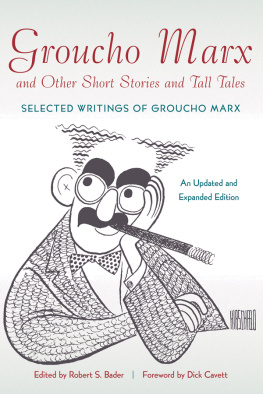R EVISITING SUSAN MARXS MANUSCRIPT NEARLY TWENTY YEARS after her death was really a team effort. First and foremost, the readers of my book Four of the Three Musketeers: The Marx Brothers on Stage who expressed interest in the unpublished work listed in the bibliography were the catalysts that started the book on its journey from storage to publication. But it never could have happened without the enthusiastic cooperation and support of Bill Marx.
An important component of my work with Susan was fact-checking her recollections. By her own admission she was terrible with dates. She was able to recall the most vivid details of events, but she simply could not remember exactly when many of them happened and needed my help to put things in order. For example, she had no idea when Salvador Dali came to visit, but she could describe the time Harpo spent with him quite beautifully. In preparing the manuscript for publication, I called upon my usual suspects in this area for help. Robert Moulton and Paul Wesolowski were so detail oriented that Susan would have given them her signature declaration, Oh, Christ. You two must be crazy. My longest-serving Marx Brothers buddy, Charlie Kochman, also deserves special mention for his words of encouragement and for patiently explaining the world of publishing to me. I have him do this every few years just to keep him on his toes.
Susan certainly would have acknowledged her children had the book been published in her lifetime. The encouragement she got from Bill, Alex, Jimmy, and Minnie while we were working together brought her joy. On my end, I must thank my wife, Tracey Goessel, who never got to meet Susan but fell in love with her while serving as my best proofreader. And of course, I owe a huge debt of gratitude to Susan for her faith in me and for trusting me with her very special story.
A FEW YEARS INTO MY MORE THAN THIRTY-YEAR FRIENDSHIP with Bill Marx, I sent his mother, Susan, an anthology of lost writings by Groucho Marx that I edited, called Groucho Marx and Other Short Stories and Tall Tales. I was living in New York at the time and several months later drove to Rancho Mirage during a visit to Los Angeles for a lunch that Bill had set up for the three of us. I didnt expect Susan to say anything about the Groucho book, but I hoped that if she had even opened it, she enjoyed the stories about Harpo in it.
After only a few minutes, Susan said, I liked your Groucho book. In fact, I liked it more than I liked Groucho. She also said something complimentary about the portions of the book that Id written, the good majority of it having been written by Groucho. She mentioned that she had been struggling to complete her memoirs and asked if I would be willing to take a look at her work. Bill laughed, knowing that, as an obsessive Marx Brothers fan and researcher, there wasnt much I wouldnt have done for the chance to read Susans manuscript. After lunch Bill and I took itparts typed, parts handwrittento a local copy center. I suppose I shouldnt have expected computer files from a writer in her eighties.
Her first draft was long, and it left me wondering about a lot of the things I expected to learn about Susans life. In particular, she seemed to have no interest in writing about her own show business career. I called Bill and told him it needed a lot of work. He suggested I give Susan my honest assessment, and I did. I told her that I thought the manuscript was lacking key parts of her story and focused too heavily on her life after Harpos death. She didnt flinch and immediately asked what I planned to do about it. That was how Susan asked me to collaborate with her on the book.
We agreed that I should start by editing and organizing what she had written before we could fill in the gaps. I sent her a new version with notations like, I think we should mention that you were in three Broadway shows, and tell me anything you can remember about being in two early John Wayne films. I was living in Forest Hills, New York, at the time, and I gave Susan my address so she could send me a few pages she was working on to answer some of my questions. She gasped when I mentioned Forest Hills. Fate has brought us together. I lived in Forest Hills when I was a little girl. She described the street where she lived, and I mentioned the Forest Hills Long Island Railroad station. She remembered the sound of the trains filling the house. Later, when she found the exact address, I took a few photos of the house for her. She told me that it hadnt changed a bit, which was true of most of that particular neighborhood, with its lovely cobblestone streets that dated back to Susans time there.
Once I had a reasonable edit and an outline, we made plans to work in person. In October 1995 I traveled to Rancho Mirage with a laptop computer and a tape recorder. When I told Susan that I had retyped her entire manuscript into a computer, she said, I thought you might be a little crazy. Now Im sure you are. She had invited me to stay in her house, and I promised to be as unobtrusive as possible. Upon my arrival, Bill, who was living nearby, took me to a local supermarket so I could pick up some food and supplies. I didnt want to get into trouble for raiding Susans refrigerator, although I was told to help myself to whatever I wanted. I woke up very early my first morning in Rancho Mirage and quietly crept into the kitchen to make myself breakfast, having been told that Susan was not an early riser. A few minutes later she appeared. You can cook? she asked. Just bacon and eggs. Nothing fancy, I assured her. She headed to the phone and I heard her tell someone, You dont have to come today. Ive got a guy here who cooks. She hung up the phone and asked, Can you do over easy?
I mentioned to Bill that I was going to find a place to watch the baseball playoffs, and he assured me that Susan would be watching every pitch. We became deeply involved in the American League Championship Series between the Seattle Mariners and the Cleveland Indians. Susan was pulling for Cleveland, and I asked why. Harpo always rooted for the underdog, and the Indians havent won a pennant since 1954, so Im for the underdog. With no real rooting interestmy team, the New York Mets, were light-years from the playoffs in those daysI jumped on the Harpo-Susan underdog bandwagon. She threw me for a loop during the sixth game of the series. In a scoreless tie at the Kingdome in Seattle, Mariners second baseman Joey Cora made an error that allowed the Indians to take the lead in what would ultimately be the deciding game of the series. As the crowd of close to sixty-thousand Mariners fans showered Cora with boos, Susan felt sorry for him and wanted the Mariners to come back so the fans wouldnt blame this poor guy for blowing the game. Well, now hes the underdog, she explained.
In between ball games we did manage to work on the book. We recorded interviews each day, after breakfast, and Susan would occasionally become frustrated by my questions about working at Fox or Paramount and being in the chorus of a Broadway musical. No one cares about that junk, she would insist. I would ask about a film she had appeared in, and she would reply, If you say I was in it, I suppose I was. It was much easier to get her talking about her childhood and her parents, topics she had also neglected in her first draft. The Forest Hills connection certainly helped break the ice in this department. But I couldnt imagine telling Susans story without getting her to talk about her work as a dancer and actressand the events that would get her to Hollywood, where she would meet Harpo.
I made a call to Bob Birchard, a noted film historian, collector, and author. Bob managed to get some prints of Susans films from a few collector friends, and I was soon driving to Los Angeles to borrow them and a projector. Susan again reminded me that I was crazy and told me to drive carefully. That evening, after the baseball game of course, I draped a bedsheet over Susans large television and fired up the projector for a screening of







